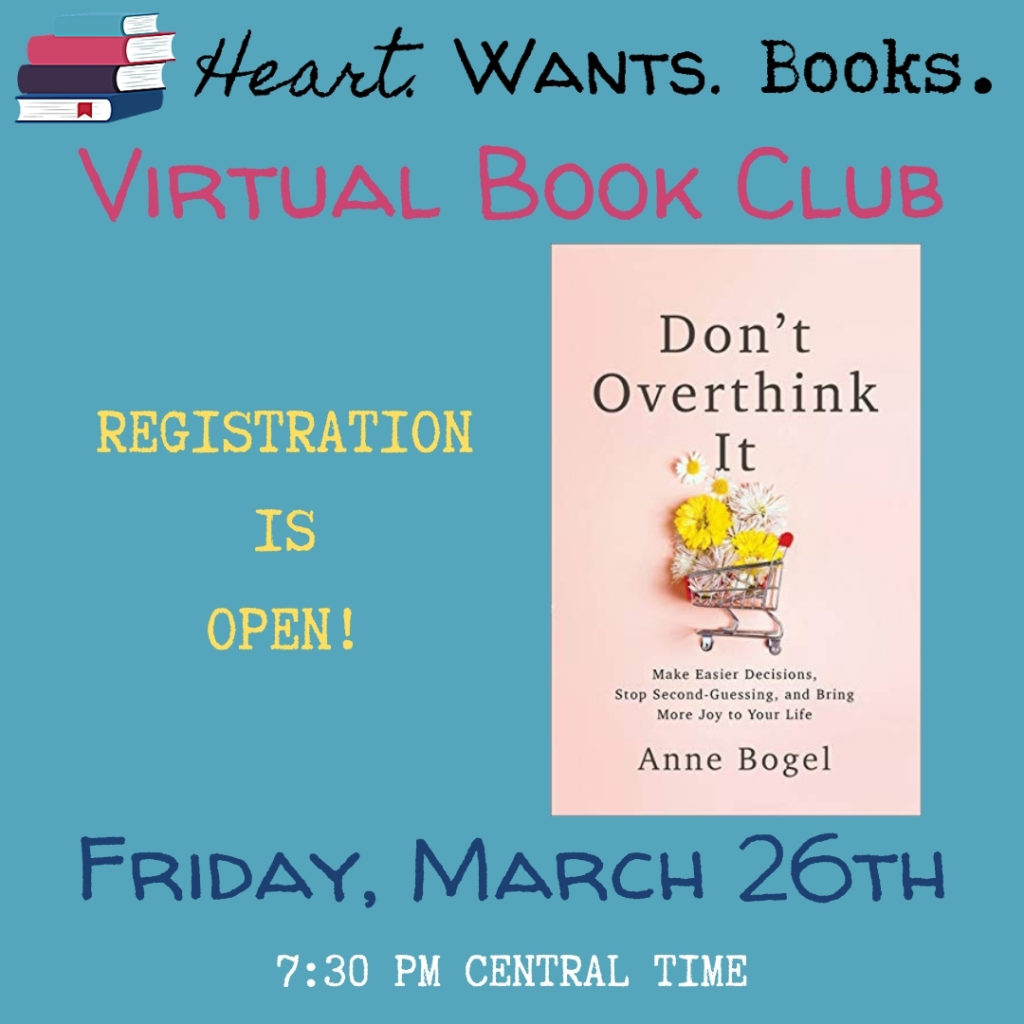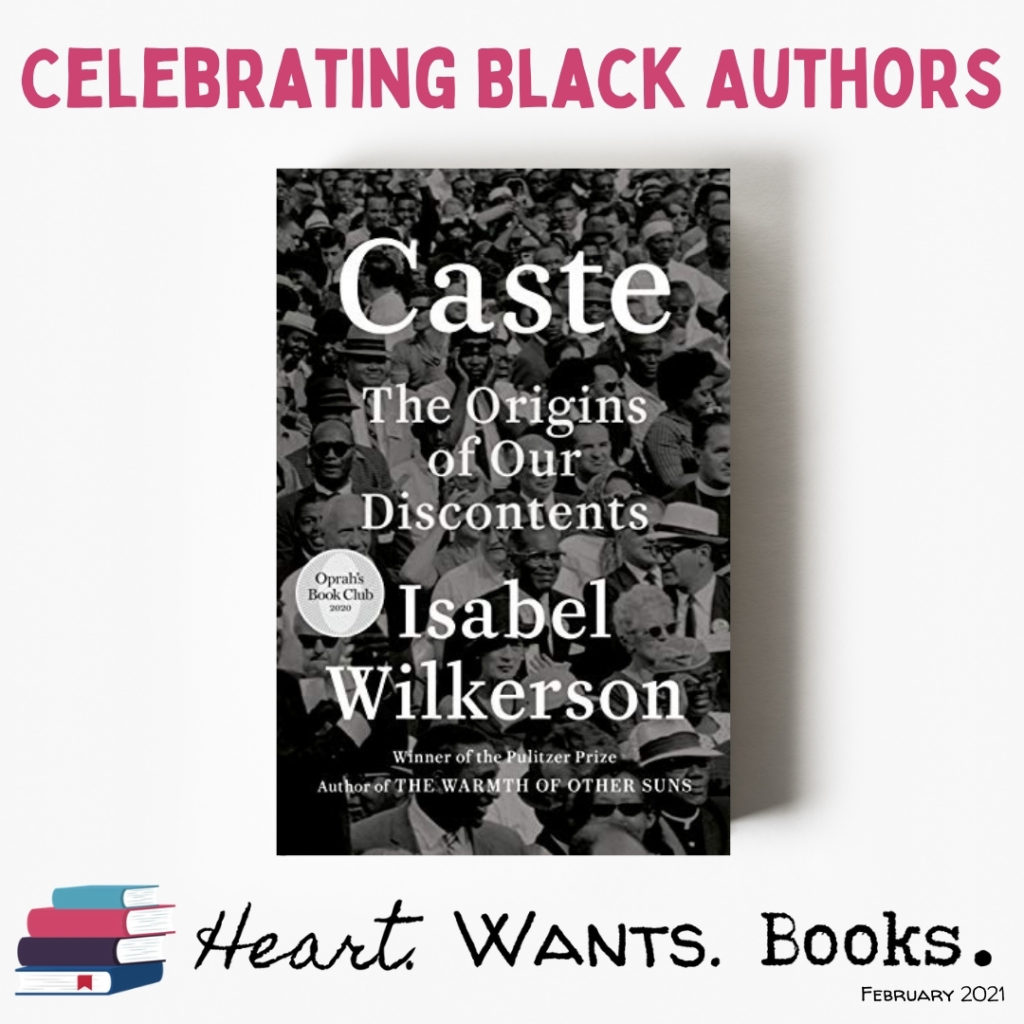Caste: The Origins of Our Discontents by Isabel Wilkerson February 18, 2021

The following post includes affiliate links. More details here. As you’re doing your Amazon shopping, we’d be ever so grateful if you’d use our affiliate link to do so as it helps pay the bills around here!

Even though we’ve been ‘snowed in’ all week, there’s still been about a thousand ways we’ve been ‘overthinking’ things in our lives. It doesn’t help that this week’s book review is an emotionally heavy read that got us sandwiching in extra fiction titles for a brain-break. March’s Virtual Book Club read is a short, non-fiction title, by that most-readerly of authors, Anne Bogel, so sign up here to join us, and don’t OVERTHINK the commitment! We’ll gather at 7:30 p.m. CST on Friday, March 26 to discuss Don’t Overthink It: Make Easier Decisions, Stop Second-Guessing, and Bring More Joy to Your Life.

Unlike the majority of our book review posts-or posts in general – Nikki is not taking the lead on our review of Caste: The Origins of Our Discontents by Isabel Wilkerson, so our format is going to be a little flipped today. I hope you’re ready, because I had a really hard time in formulating a post that doesn’t read like an academic paper. ::waves:: Hi, name is Ashley and I have a degree in History. It is the reason why author bio- and biblio-graphical research is in my weekly purview. Before author Isabel Wilkerson became a household name with her 2010 debut title, The Warmth of Other Suns: The Epic Story of America’s Great Migration, she won the 1994 Pulitzer Prize in Feature Writing, the first African-American woman to win a Pulitzer Prize in Journalism, when she was Chicago Bureau Chief of The New York Times. Her accomplishments and accolades include the National Humanities Medal, a National Book Critics Circle Award and NAACP Image Award for The Warmth of Other Suns, a Guggenheim Fellowship, and professorships at Universities across the country including Emory, Princeton, Northwestern, and Boston University’s College of Communication. Check out her 2017 TED Talk here, about the power of a single decision. She’s a native of Washington D.C.
Caste is an emotionally heavy read, be prepared. But, it is so well written that you don’t realize in the process of reading it that it is an impeccably researched academic manuscript. It is narrative nonfiction that interweaves personal anecdotes with academically minded interviews. It’s no wonder that Oprah chose it as her 2020 Summer Book Club Pick and calls it “required reading for all of humanity.” I am going to second Oprah on this one. I have gotten into the habit of paying a lot of attention to the table of contents in all of the books I read lately, particularly the nonfiction titles. This is a learned habit and something I highly recommend to those taking intentional control of their reading lives. You can figure out a lot about a book by the way it is structured. Caste is separated into seven parts and thirty-one chapters. Wilkerson covers the three most well-known global caste systems: India, America, and Nazi Germany by formulating the Eight Pillars of Caste that are found within all three. These Pillars are: Divine Will and the Laws of Nature, Heritability, Endogamy and the Control of Marriage and Mating, Purity versus Pollution, Occupational Hierarchy, Dehumanization and Stigma, Terror as Enforcement, and Inherent Superiority versus Inherent Inferiority. It would take too many words to explain which each of these mean, and Wilkerson obviously does a much better job in each of these topics. If you’d enjoy more in-depth discussion on the eight pillars, join Oprah and Wilkerson on Oprah’s Book Club Podcast which has eight episodes exploring the pillars of caste. I want to, instead, focus on a couple quotes/sections that really got me into my thoughts and feelings.

Let’s focus in on “Chapter Twenty: The Inevitable Narcissism of Caste.” Wilkerson discusses how the highest caste, in America that would be white people if you were actually wondering about that, live with the reassurance from the images of themselves in the media that they are the “default-setting of normalcy, of intellect, of beauty, against which all others are measured” and those others are constantly found wanting. “History has shown that nations and groups will conquer, colonize, enslave, and kill to maintain the illusion of their primacy,” which is group narcissism. Social Theorist Takamichi Sakurai wrote: “Group narcissism leads people to fascism. An extreme form of group narcissism means malignant narcissism, which gives rise to a fanatical fascist politics, an extreme racialism.” This is seen in both Nazism and the American Caste system. In the American system it has its history in the eugenics hierarchy of presumed value. At one time not so long ago in American history, being from or having immigrant family members from Ireland or Italy put you only one rung higher in the caste system than the lowest rung of African-Americans, and even then there were layers upon layers of hierarchy involved. The only thing I could think of when reading these passages is that the thing that exacerbates these imaginary hierarchies are ancestry/DNA tests. The only people I find who actually care about ‘where in the world’ your DNA comes from are those who, on some level, want to, as said above, maintain the illusion of their primacy in the caste system. I can’t tell you how many times I have answered “I’m an American” or “I come from New Orleans” to the annoyance of whatever white person is asking me “what are you?” – when they really want to know from which area in Europe my immigrant ancestors hailed. I don’t find that I am any better or worse of a person by fixating on my ‘heritage,’ and those facts have not helped or hindered me in any way besides inherently sticking me in the highest caste by making me a white woman living in America.
I want to leave you with a quotation from chapter two which hit me really hard as both an old house lover and a Realtor:
“With an old house, the work is never done, and you don’t expect it to be. America is an old house. We can never declare the work over. Wind, flood, drought, and human upheavals batter a structure that is already fighting whatever flaws were left unattended in the original foundation. When you live in an old house, you may not want to go into the basement after a storm to see what the rains have wrought. Choose not to look, however, at your own peril. The owner of an old house knows that whatever you are ignoring will never go away. Whatever is lurking will fester whether you choose to look or not. Ignorance is no protection from the consequences of inaction. Whatever you are wishing away will gnaw at you until you gather the courage to face what you would rather not see.”
And isn’t that the crux of all inner work in becoming a better human? Let’s do the hard work and not ignore the issues that won’t go away. Only we can fix the structural issues our ancestors built into the foundations of our old house before they get any worse.
~Ashley

Dear readers, I wasn’t sure what I expected Caste: The Origins of Our Discontents by Isabel Wilkerson to be, but it’s so much more. Ashley’s also gotten me in the habit of reading the table of contents before digging into a book just to see what’s there (and sometimes knowing roughly when to expect the ending of a story or text is helpful too, especially in a nonfiction book with lots of endnotes), so I was very intrigued by the structure (in a good way, which isn’t always the case), but also the comparisons in the titles of the parts and the chapters. In case you hadn’t already picked up on this, I tend not to read marketing copy as a rule. I hear about books from other readers, and perhaps read a review or two, and then it lands on my TBR list.
Just from the title I knew there was going to be a connection to India, but I didn’t see the Nazi connection coming, and in retrospect, as Wilkerson explains, it makes perfect sense, and it’s also horrifying. The horror isn’t just what Nazis did to those they perceived to be in the subordinate caste, but how they came up with their methods. Just as our forefathers looked at the structure of governments that came before ours, the Nazis looked at caste systems that came before theirs, specifically American slavery. Wilkerson removed my blinders to this reality and several more pieces of information that I knew, but hadn’t connected previously.
I think that is what makes Caste so important. Wilkerson outlines parallels across time and distance, some intentional and others not, which helps readers to see with new eyes. I’m not unfamiliar with the evils of slavery in America and the Jim Crow era, nor am I unfamiliar with the plight of the Dalits, but how the Nazis designed their purity scheme, their evaluation of the brutalities of American slavery, and what they thought of the tragic history of those centuries, that was new to me. It is those snippets of information that really make this book shine, because of the alignments that are right there, if only you make the connection, and Wilkerson handles the heavy lifting and then some. She does it with the skill, precision, and bluntness of a journalist, and keeps doing it through the whole book. There is no apology, there’s information and analysis.
Generally I gravitate towards fiction, because I want to learn through stories rather than research, but as Ashley said, this is both stories and research, masterfully woven together. Caste is the story of Dalits, Jews, and African Americans, the story of how they have been failed by the rest of us, written by a thorough researcher, an impressive journalist, and a fantastic writer. I’m not likely to read this again, because, let’s be real, it’s not a fun hang, but it is important. I’m glad I read Caste, and I’ll be recommending it and referencing it. Caste explains how we got here, so now the question is how do we dismantle our caste system? I don’t have all the answers, but I’m thinking one relationship created and one stereotype debunked at a time.
~Nikki

PLEASE SUPPORT US WHEN YOU SHOP BY FIRST CLICKING ON THE IMAGES BELOW:








